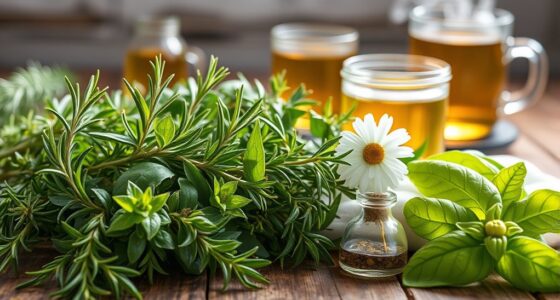Your hydration needs depend on your activity level, climate, age, and health, but it’s not just about drinking water—it’s about balancing your electrolytes like sodium, potassium, and magnesium. Drinking small, regular sips and paying attention to your body’s signals are more effective than gulping large amounts. Overhydration can be dangerous, so maintaining harmony between water and electrolytes is key. Keep going to discover how to optimize your hydration for better wellness.
Key Takeaways
- Individual hydration needs vary based on activity, climate, age, and health; there’s no universal water intake amount.
- Drinking small, regular sips is more effective than gulping large amounts at once.
- Proper hydration includes replenishing electrolytes lost through sweat to maintain muscle and nerve function.
- Overhydration can cause hyponatremia, so listening to your body’s thirst signals is essential.
- Eating a balanced diet with fruits, vegetables, and nuts helps naturally maintain your electrolyte and hydration levels.

Have you ever wondered how staying properly hydrated can boost your overall wellness? It’s a common question, and the answer isn’t as straightforward as just drinking water whenever you’re thirsty. Proper hydration involves more than simply chugging glasses of water; it’s about maintaining the right electrolyte balance in your body. Electrolytes like sodium, potassium, and magnesium help your muscles function, your nerves communicate, and your blood maintain proper pH levels. When these are out of whack, dehydration symptoms can worsen, and your health can suffer. Many hydration myths circulate, like the idea that you need to sip water constantly or that drinking large amounts in one go is best. But the truth is, your hydration needs depend on your activity level, climate, age, and overall health. Drinking small amounts regularly throughout the day is generally more effective than gulping down a lot at once.
Understanding electrolyte balance is key here. If you sweat heavily, whether from exercise or heat, you lose not just water but also electrolytes. Replenishing both ensures your body stays in sync. Sports drinks can help in these situations because they contain electrolytes, but they often have added sugars, so they shouldn’t be your daily go-to. Instead, focus on a balanced diet rich in fruits, vegetables, and nuts, which naturally supply these essential minerals. Proper hydration isn’t just about drinking water—it’s about replacing what you lose and maintaining that delicate electrolyte harmony. If you overlook this, you risk symptoms like muscle cramps, fatigue, or dizziness, which are signs your body’s electrolyte balance is off. Additionally, hydration requirements vary from person to person, emphasizing the importance of personalized hydration strategies.
Many hydration myths can lead you astray. For example, some believe you must drink eight glasses of water a day regardless of your needs. But everyone’s different. Your body will signal when it needs water, and overhydration can be just as harmful as dehydration. Excessive water intake can dilute electrolytes, leading to a dangerous condition called hyponatremia. So, listening to your body and understanding your individual hydration signals is essential. Keep an eye out for signs like dark urine, dry mouth, or feeling sluggish. These are clues that you might need more fluids or electrolytes.
Frequently Asked Questions
Does Thirst Always Indicate Dehydration?
Thirst perception doesn’t always mean you’re dehydrated; sometimes, it’s just your body’s hydration cues signaling you to drink. You might feel thirsty after physical activity or in hot weather, but you can also experience dry mouth or fatigue without true dehydration. Pay attention to other signs like dark urine or dizziness. Trust your body’s signals, but remember that thirst isn’t the only indicator of your hydration status.
Can Drinking Too Much Water Be Harmful?
Think of your body as a delicate pond, where too much water can overflow and disturb the balance. Drinking excessively can harm your electrolyte balance and strain your kidneys, risking health issues. You need just enough to keep the pond clear and healthy. Stay mindful, sip wisely, and listen to your body’s signals—overhydration can be as harmful as dehydration, so balance is key for kidney health and overall wellness.
How Does Hydration Affect Mental Clarity?
Staying well-hydrated boosts your mental clarity by preventing brain fog and sharpening focus. When you drink enough water, your brain functions at its most effective, improving concentration and decision-making. Dehydration can cause confusion and sluggish thinking, making it harder to stay alert. By maintaining proper hydration, you support your cognitive processes, ensuring you stay sharp throughout the day. So, keep sipping water regularly to enhance focus and clear mental fog.
Are There Differences in Hydration Needs for Athletes?
As an athlete, your hydration needs differ from others because you lose more fluids and electrolytes through sweat. Maintaining electrolyte balance is vital, so you should focus on hydration timing—drinking before, during, and after activity. This guarantees peak performance and recovery. Unlike sedentary individuals, you require tailored hydration strategies to stay energized and avoid dehydration, especially during intense or prolonged workouts.
What Are Signs of Overhydration or Water Intoxication?
You might experience signs of overhydration or water poisoning if you feel nausea, headache, or confusion. These symptoms indicate an electrolyte imbalance caused by drinking too much water. You could also suffer from swelling or muscle weakness. To avoid this, don’t overconsume water, especially during intense exercise, and listen to your body’s signals. Maintaining a balance helps prevent electrolyte imbalance and water poisoning.
Conclusion
Remember, staying hydrated is like watering a delicate plant—your body thrives when you give it enough moisture. Think of water as the gentle stream that keeps your internal garden blossoming, vibrant and strong. Drink enough to keep your energy flowing and your mind clear, like a crystal-clear lake reflecting the bright sky. Embrace this simple act, and watch how your wellness blooms, turning each day into a fresh, vibrant canvas of significance.









